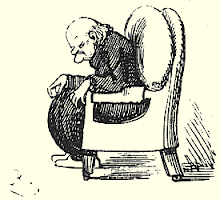My wife likes to chide me.
(Wives do that, just so you know.)
I've lived in the same place my whole life. I know all kinds of meandering shortcuts and long-ways-home. I can take you mansion sight-seeing a couple towns away, subliminally finding my way to this impressive home or that stoney, Gothic, gargantuan dwelling, or I can take you on a somewhat less-than-thrilling tour of the sights of my childhood: my old elementary school, the hardcore synagogue my family used to attend (guys in the pews, gals in the balcony), there's the house where my pediatric allergist collapsed and died of a heart attack in his garage, there's the pharmacy where I stole my first glance at a "Playboy," there's the lawn I slid onto in my old Volvo 240 in the snow on my way home from school. You know-- because I was driving like a sixteen-year-old dickball.
And, if you were in the car with us, maybe holding onto the green stuffed monkey I keep in the back of my car, you might giggle, or roll your eyes, when you'd inevitably hear my wife say to me,
"Oh, Bobber-- it's so funny how you always know just where you're going around here but you don't know the names of any of the streets."
And she's right. I don't.
But I'd never get you lost. Stick with me, kid.
Street names are important, but not to me. They don't help me get where I'm going-- not when I'm in my own backyard. Of course, when giving directions to our house to people, it can be a bit challenging, because I start invoking landmarks in a harried panic when I realize I don't know the names of any of the streets surrounding my own home. My street is one piddly little block, sandwiched in between two perpendicular streets, and I even have trouble remembering which street bears which name. That's how bad it gets. If you're ever coming to see us, make sure that GPS is strapped to you like a breastpump.
Near the Pennsylvania/Delaware border, there's a street that intersects Route 1, feeding into a commercial development, and the street is called "Consumer Credit Way." I don't go down Route 1 that far that often but, when I do, and I pass that intersection, I always shake my head. What a waste of an opportunity.
An opportunity for what? Well, I don't know. We like to name things in this culture. We dedicate things. We consecrate things. Buildings, parks, rec centers, bridges, tunnels, stadiums and, yeah, streets. Well, at least, some of us like to do it.
On May 1st, 1981, NYPD Patrolmen John Scarangella and his partner, Richard Rainey were driving in their radio car together down a street in Queens. Who remembers what street it was? Doesn't matter much anymore, I suppose. While on patrol, they happened upon a filthy, white van that fit the description of a vehicle used as the getaway car in several burglaries. Flipping on their car's lightbar, a couple of bonks on the airhorn. Call it in.
The shooting started before Scarangella and Rainey even got out of their radio car. Bullets-- 30 white-hot bullets-- screaming through the warm spring air, shattering their windshield, pummeling through metal. Richard Rainey was shot fourteen times and miraculously survived. John Scarangella, 42 and the father of four children, was shot twice in the head. He clung to life's frayed edges in the hospital for two weeks before the thread frayed its final time.
Signal 10-13. Call it in.
29 years after the blood of Patrolmen Scarangella and Rainey had long since been washed from that pavement in Queens, a fight was being waged to name another piece of pavement-- Baisley Boulevard in South Jamaica-- for the slain Patrolman John Scarangella. It was an idea spearheaded by Scarangella's sons, Thomas and Gerard. Happy Father's Day, John.
It might come as a surprise that not everybody was so into the idea. Adjoa Gzifa, the chairwoman of Queens-based Community Board 12, rejected the initial application. Other applications to name streets after fallen police officers have received the cold shoulder from Ms. Gzifa as well who, apparently, isn't such a fan of the NYPD. Most people who aren't, I expect, might alter their opinion if they saw someone trying to force their way into their house in the middle of the night.
Whom would they call then-- Greenpeace?
I've made that argument before, and it's annoying to make. It's blue-collar and it's tired and and it's cliche, and it's, well, sad.
It finally happened, though. A couple of days ago, it was decided that a section of Baisley Street, the part that runs past John Scarangella's 113 Precinct, will be named Officer John Scarangella Way. And I hope people pay a hell of a lot more attention to that street sign than I pay to all of the ones in my neighborhood.
I don't know why, exactly, I decided on this story to write about for Christmas Day. Maybe because it's a gift to the Scarangella family, who has suffered such intense tragedies and indignities and wrongs since May 1st, 1981. Perhaps because it's a gift to the people of New York City, another chip in the pocket of dignity and honor. Maybe because it's a story about sacrifice and redemption. Maybe it's something we can feel good about-- that sometimes in this dirty little world of ours, the good guys do win-- even if what they've won is a piece of pavement and a metal sign on a pole.
Maybe because, today especially, it's a particularly convenient time to be grateful that men like Richard Rainey and John Scarangella ever walked this earth.
Merry, merry Christmas.
Lauren Soloy’s The Newest Gnome: A Quiet Adventure
5 months ago












